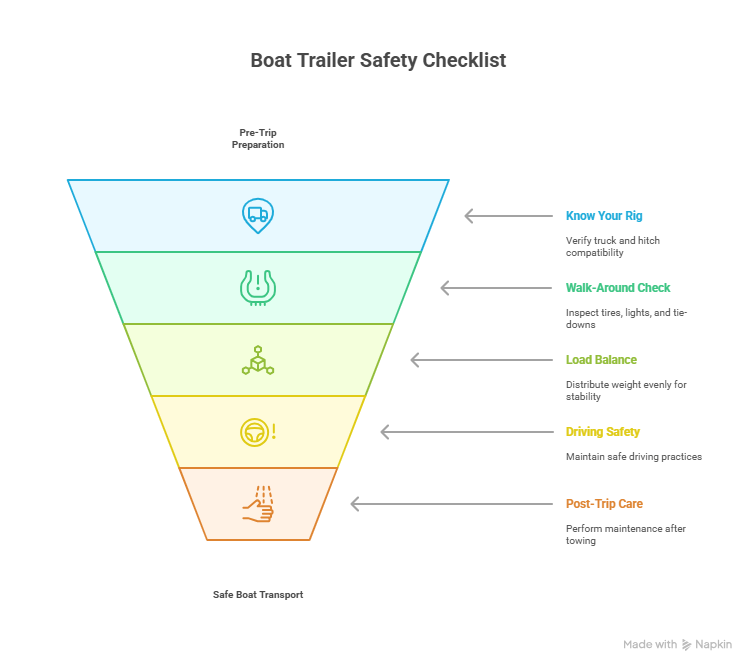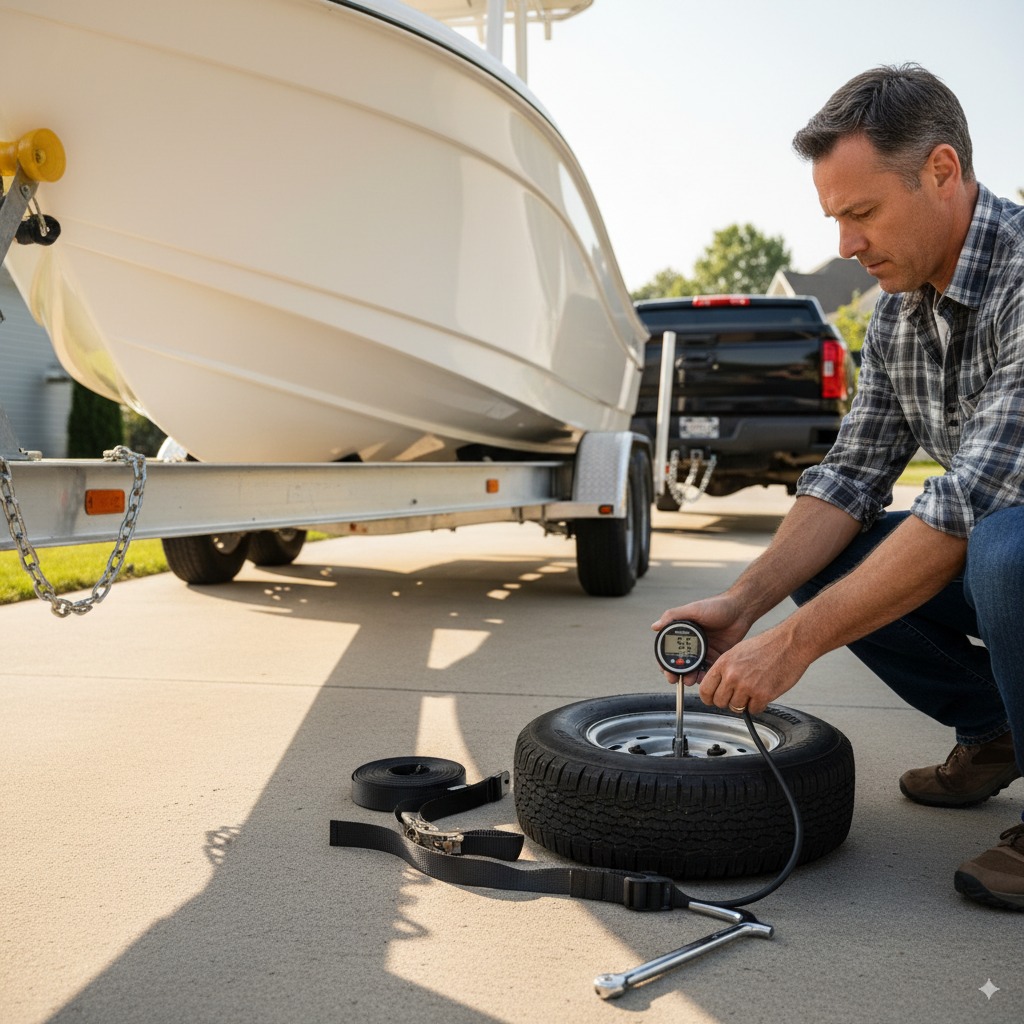My Guide to Boat Trailer Safety Tips That Actually Work
I’ll never forget the first time I saw it happen. I was heading down I-95 towards the Keys, and a guy towing a brand-new center console started to get the dreaded trailer sway. You could see the panic on his face as the back of his truck started wagging like a dog’s tail. He slammed on the brakes—the worst possible thing to do—and nearly lost the whole rig. He managed to recover, but I bet that trip was the most stressful drive of his life.
That image has stuck with me for years. Owning a boat is supposed to be about freedom and fun, but for a lot of people, the towing part is a white-knuckle nightmare. It doesn’t have to be. Mastering a few essential Boat Trailer Safety Tips can turn that anxiety into pure confidence.
This isn’t just about ticking boxes on a checklist. It’s about understanding why things can go wrong and how to prevent them before you even leave the driveway. I’ve been trailering boats for over 20 years, from small skiffs to heavy offshore machines, and I’ve learned these lessons the hard way so you don’t have to.
In this guide, I’m going to share the practical, no-nonsense Boat Trailer Safety Tips that have kept me and my boat safe on thousands of miles of highway. We’ll cover everything from the pre-trip walk-around to how to handle emergencies on the road. Let’s get you from your driveway to the boat ramp, stress-free.
Table of Contents
Before You Go: The Pre-Trip Ritual
This is where safety starts. A thorough pre-trip check is the most important of all Boat Trailer Safety Tips. Spending ten minutes in your driveway can save you hours of headache on the side of the road.
Know Your Rig
First, make sure your truck can actually handle your boat. Look up your vehicle’s tow capacity and weigh your fully loaded boat and trailer at a CAT scale. A good rule of thumb is to keep your total weight under 80% of your truck’s max rating. That buffer is your friend, especially on hills or in windy conditions.
Then, check your hitch setup. The hitch ball size must match the trailer coupler. Make sure the coupler is locked, the pin is in, and the safety chains are crossed underneath in an “X” pattern. That “X” will cradle the tongue if the hitch ever fails, preventing it from digging into the pavement.
The Walk-Around
- Tires: This is huge. Check the pressure on all tires—truck and trailer. Under-inflated tires are the #1 cause of blowouts and sway. Look for cracks in the sidewalls.
- Lights: Have someone help you test your brake lights, turn signals, and running lights. Don’t be that guy with no lights at dusk.
- Tie-Downs: Your boat needs to be strapped down tight to the trailer frame, not just held by the winch line. The winch is for loading, not for transport. I use at least two heavy-duty straps at the stern, pulling down and slightly forward.

Loading for the Road: Balance is Everything
How you load your boat is critical. An unbalanced trailer is an accident waiting to happen. The goal is to get the right amount of tongue weight—the downward force on your hitch ball.
Aim for about 10-15% of your total loaded trailer weight on the tongue.
- Too little tongue weight: The trailer will be “light” in the back and prone to violent sway.
- Too much tongue weight: It will squat your truck’s rear suspension, affecting steering and braking.
Center the boat perfectly on the trailer. Distribute your gear—coolers, tackle, fuel—evenly over the axles. Don’t pile everything in the stern. A few practical Boat Trailer Safety Tips for loading can make all the difference in how your rig handles on the highway.
Bunk vs. Roller Trailers: A Quick Comparison
The type of trailer you have also plays a role in support and stability. Here’s a quick breakdown:
| Trailer Type | Pros | Cons | My Take |
|---|---|---|---|
| Bunk Trailer | Excellent hull support, very stable for transport, fewer moving parts to maintain. | Can be difficult to launch/load at shallow ramps. | My choice for long hauls and storing the boat. The solid support is unbeatable. |
| Roller Trailer | Super easy to launch and retrieve, even at bad ramps. You can almost “roll” the boat off. | Less hull support, more moving parts (rollers) to check and maintain. | Great for people who launch frequently at various ramps, but you have to be vigilant about checking the rollers. |
On the Road: Driving with a Purpose
Towing isn’t just driving. You have to think differently.
- Leave Space: Your stopping distance is way longer. Double your normal following distance, at least.
- Gentle Inputs: No sudden moves. Accelerate smoothly, brake early, and take turns wider than you think you need to. Your trailer will cut the corner.
- Handling Sway: If you feel the trailer start to sway, do not slam on the brakes. Take your foot off the gas and hold the steering wheel straight. Let the rig slow down on its own. If you have a trailer brake controller, you can manually apply a little trailer brake to help straighten it out.
- The Stop-and-Check: On longer trips, pull over every hour or so. Put your hand on the hubs and tires. They should be warm, but not sizzling hot. A hot hub is a sign of a failing bearing. Check your straps. This is one of the most overlooked but crucial Boat Trailer Safety Tips.
After the Trip: Post-Tow Care
You made it to the ramp or back home. You’re not done yet.
- Chock the Wheels: Before you unhitch, always chock the trailer wheels. I’ve seen trailers roll away because someone forgot this simple step.
- The Freshwater Rinse: If you dunked your trailer in saltwater, rinse it thoroughly with fresh water as soon as you can. Salt will destroy your trailer—axles, brakes, lights, everything. This is one of the most important long-term Boat Trailer Safety Tips.
FAQ: Questions I Get Asked All the Time
How fast can I go when towing?
I stick to the posted speed limit for trucks, or 65 mph, whichever is lower. Speed is a major factor in trailer sway. It’s not a race.
My trailer sways a little bit. Is that normal?
No. A properly loaded trailer should track straight and true. If you have any sway, pull over immediately and check your tire pressure and weight distribution. Something is not right.
Do I really need trailer brakes?
Most states require them over a certain weight (usually around 3,000 lbs). But honestly, if you’re towing anything bigger than a small skiff, you want them. They make a huge difference in stopping power and safety.
How often should I service my wheel bearings?
I repack mine with fresh grease every year, without fail. It’s cheap insurance against a catastrophic failure on the highway. This is a non-negotiable part of my annual Boat Trailer Safety Tips routine.
What’s the single biggest mistake you see people make?
Relying on the winch line to hold the boat. I see it every day at the boat ramp. That line can and will snap. You must have the bow strapped securely to the trailer winch post.
Key Takeaways: My Final Thoughts
Alright, let’s wrap this up. Safe towing isn’t about being scared; it’s about being prepared. These Boat Trailer Safety Tips are all about building a routine so that safety becomes second nature.
- The Pre-Trip Check is Everything: Tires, lights, hitch. Every single time.
- Balance is Your Best Friend: Get your tongue weight right (10-15%). It’s the key to a stable tow.
- Strap it Down Like You Mean It: Use heavy-duty straps, not just the winch line.
- Drive Like a Pro: Leave space, be smooth, and anticipate everything.
- Maintain Your Gear: A little grease and a freshwater rinse go a long way.
Building these habits will take the stress out of towing and let you focus on what really matters—enjoying your time on the water.
Author Bio
I’m Alex, a lifelong boater with over 20 years of experience trailering everything from bass boats to 30-foot offshore fishing machines. I’ve learned these Boat Trailer Safety Tips through thousands of miles on the road, from the mountains to the coast. My goal is to help every boat owner tow with confidence and get to the water safely.


Leave a Reply